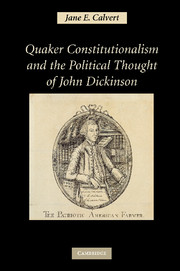Introduction
Published online by Cambridge University Press: 27 July 2009
Summary
Few religious groups in America have provoked such mixed and extreme reactions as the Religious Society of Friends. Commonly known as Quakers, since their inception in the 1650s and their energetic pursuit of dissenters’ rights, they have been scorned and celebrated by popular and scholarly observers alike. While some commentators have derided them for arrogance, hypocrisy, and the subversion of social and political institutions, others go as far as to say that the Quakers “invented” America and credit them with originating much of what is right and just in this country. Interestingly, others still have dismissed them as irrelevant to the larger questions of American political life or simply taken no notice.
Yet as anyone with a passing familiarity with American history might observe, in one way or another, for better or worse, Quakers have been an important force. They were ubiquitous and “peculiar,” as they described themselves, in the seventeenth and eighteenth centuries; it is well-known that Quakers caused significant difficulties for Massachusetts Puritans and that Pennsylvania was a Quaker colony. Although they blended into American culture more in the nineteenth and twentieth centuries, very little probing of the more recent past reveals them to be equally present; many, for example, are aware that Friends had a prominent role in the social reform movements of the Antebellum period. Beyond that, at the very least, it would be hard to find an American today unfamiliar with the Quaker Oats man, contrived image though it is.
- Type
- Chapter
- Information
- Publisher: Cambridge University PressPrint publication year: 2008



